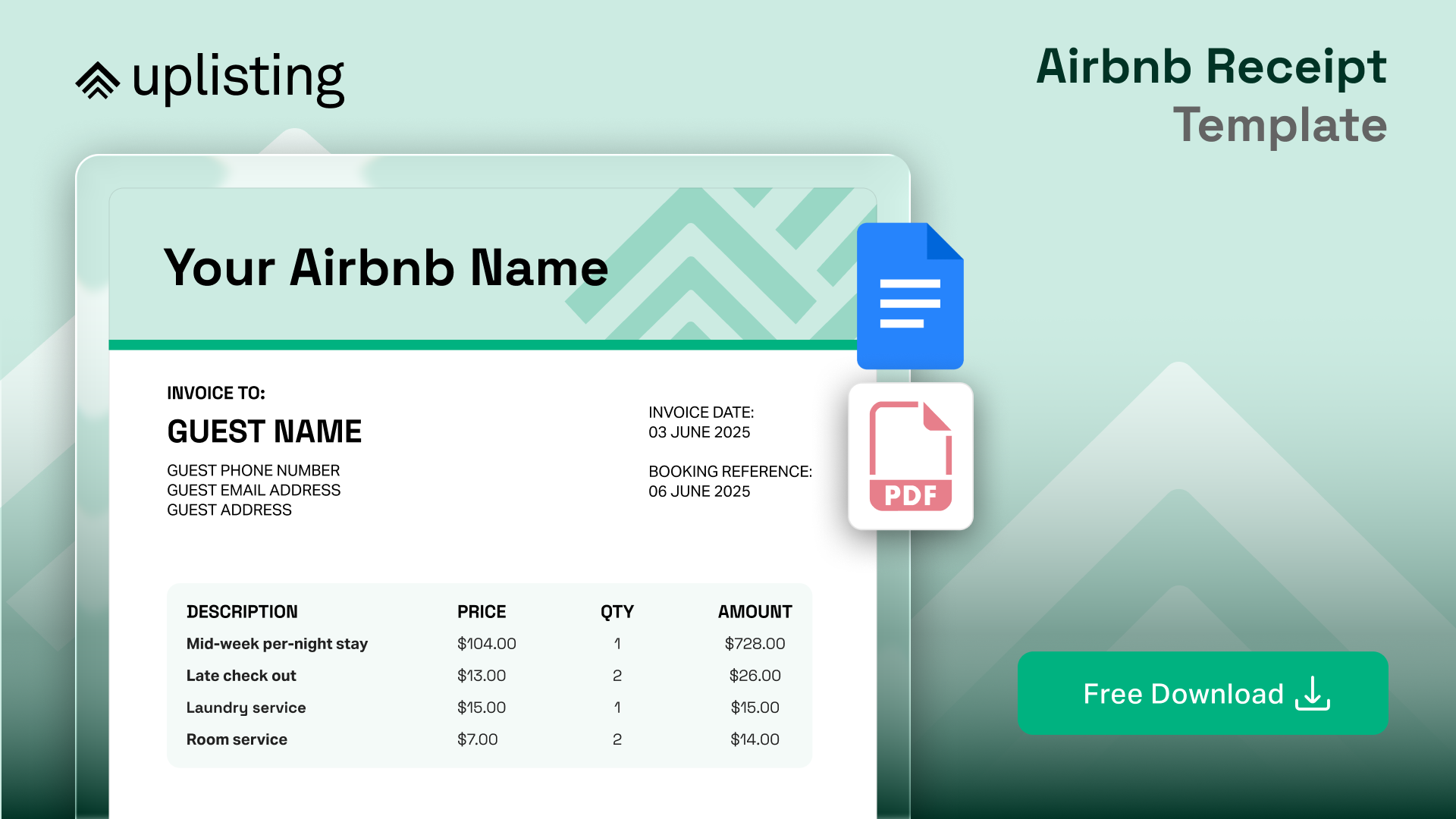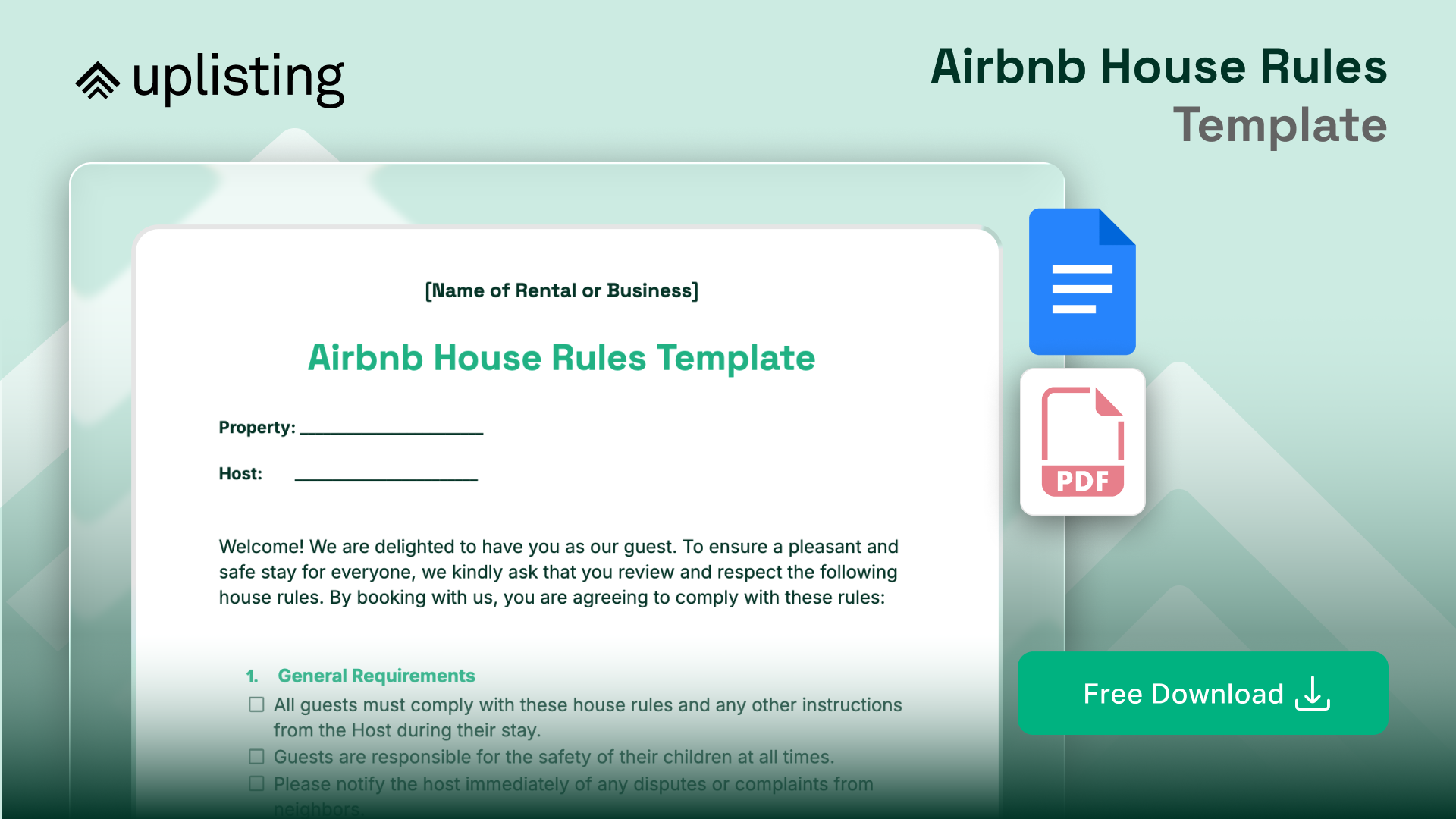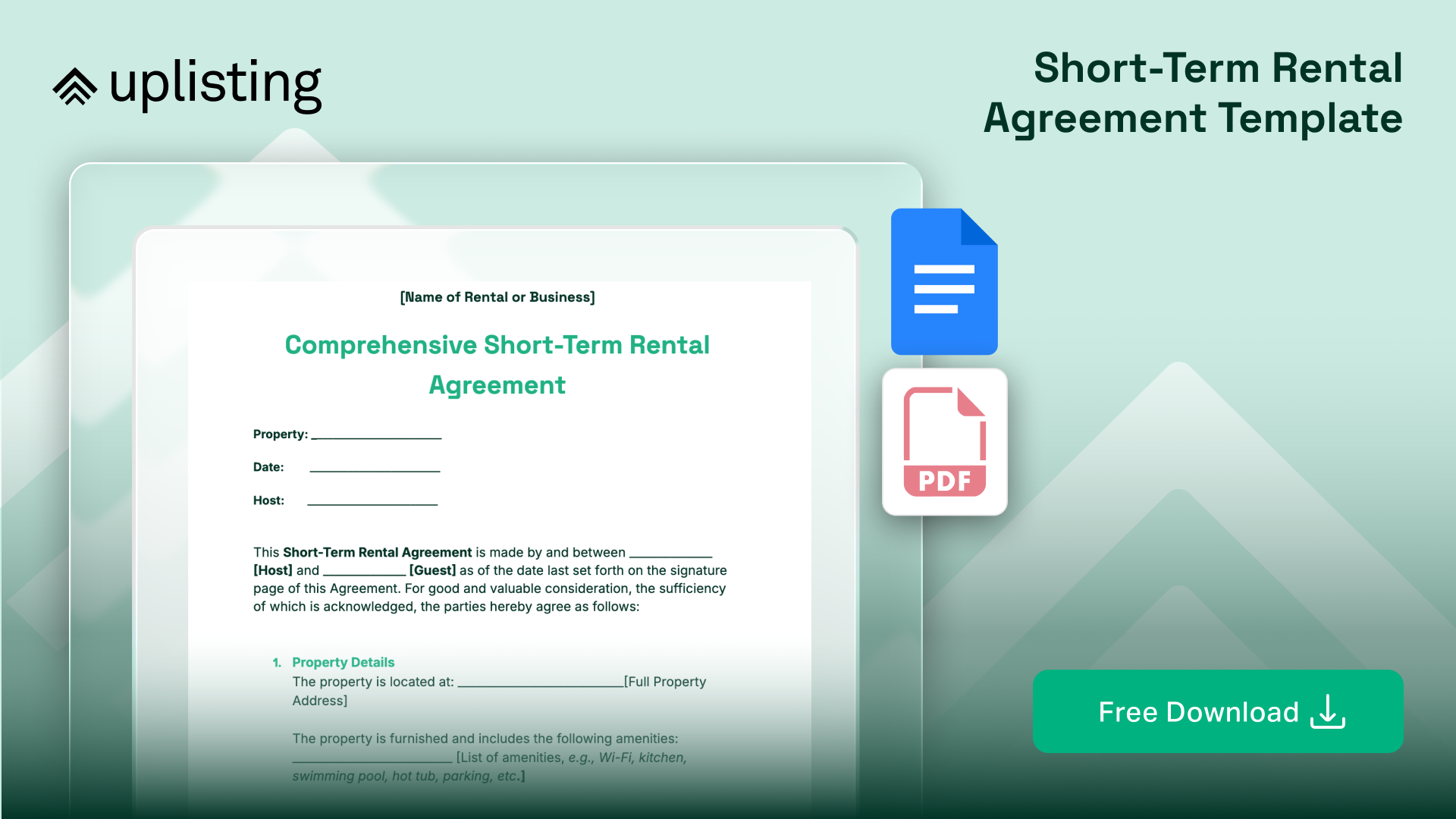Key Takeaways
You can become an Airbnb cohost without owning any property by partnering with existing hosts who need support.
Cohosts handle guest communication, task coordination, and listing management based on clear agreements.
Working as an Airbnb cohost role offers a low-barrier entry point into the short-term rental industry, ideal for entrepreneurs looking to build income without buying real estate.
Fancy making money from real estate, but don't have the bank balance to invest in property yourself?
Airbnb cohosts manage real bookings, real guests, and real revenue, without ever needing to own the property. That’s what makes it such an efficient entry point for anyone looking to build a short-term rental business from the ground up.
As a cohost, you get hands-on experience with STR operations, build a portfolio, and create value for property owners who don’t want to do it all themselves. It’s one of the fastest ways to learn the STR industry while generating income.
In this guide, we’ll break down exactly how to become an Airbnb cohost step-by-step. We’ll cover what the role involves, how to find opportunities, and how to set up the right agreements that keep things clear and profitable. You’ll walk away with a structured path to build a cohosting business that works... Without owning a single unit.
Why Cohosting Is a Great Entry Point to Real Estate
Most business models (and especially property) demand upfront capital, long-term risk, and the kind of debt that keeps you up at night. Cohosting skips all of that.
You can run short-term rentals without buying property. No mortgage. No tax bills. No down payment bleeding your savings. You're not tied to one location, either. Instead, as a cohots, you’re building a reputation guests trust and owners need.
The day-to-day? Well, it’s a lot more than forwarding guest messages or chasing down late cleaners. As a cohost, you'll need direct experience with pricing, turnover coordination, and guest expectations. Instead of watching from the sidelines, you're learning what actually keeps occupancy high and reviews strong. The only difference is that you’re doing it without risking your own capital.
So, how exactly can you become an Airbnb cohost? Let's break it down.
Create 5-star guest experiences
Give your guests unforgettable experiences
With Uplisting, you can send the right messages at the right time on all booking sites. Read and respond to guest messages in a single, unified inbox — whether you’re at the office or on the go.
Step 1: Learn the Basics of Airbnb Hosting
Before managing someone else’s listing, you need to know how Airbnb actually works.
Airbnb sets clear expectations around listing quality, communication, and guest experience. Hosts who understand the system earn better visibility, better reviews, and more bookings. Cohosts who don’t? They get replaced.
Get to know the rules that matter
Airbnb policies directly impact visibility and performance.
You need to know how reviews affect search ranking, how late responses trigger penalties, and why cancellations hurt more than they seem. The platform tracks your every move, including all those slow replies, vague messages, or missed inquiries. Staying sharp is non-negotiable.
If you’re aiming to meet Superhost standards, keep a 4.8+ star rating, respond to at least 90% of messages within 24 hours, and avoid cancellations unless there’s no other option.
Understand what guests expect
Guests don’t just want a clean unit and working Wi-Fi. They want fast answers, smooth check-ins, and someone who knows how to fix problems without making them worse. The best cohosts anticipate friction points and deal with them before anyone has to ask.
If you’ve stayed in an Airbnb and thought, “Why wasn’t that obvious thing fixed?”, then you’re already on the right track. Pay attention to what guests complain about, what earns five-star reviews, and what makes a stay forgettable.
Study what drives performance
Top listings aren’t lucky. They follow a formula, with strong vacation rental photos, clear descriptions, competitive pricing, and fast replies. Airbnb’s algorithm pushes listings that look sharp, respond quickly, and leave guests happy.
If you want to learn how to become an Airbnb cohost, start by studying which listings show up first in your market.
Look at how they’re priced, how they’re photographed, and how they describe the space. Check their reviews and see what guests notice. Then build a system that mirrors what works.
Step 2: Define the Services You’ll Offer
Not every owner needs a full-time cohost. Some just want help answering guest messages. Others expect someone to handle guest support, turnovers, pricing, and everything between check-in and check-out.
Before taking on any listings, get specific about what you’re actually offering. Clarity helps you stay efficient and avoid gaps in responsibility later.
Use the right tools to stay efficient
Managing short-term rentals without tools is like running a front desk with sticky notes. You’ll forget arrival times, miss guest replies, and scramble to fix avoidable issues. Automating guest messages, syncing calendars, and using smart pricing software keeps everything on track, especially if you're juggling more than one listing.
You don’t need a massive tech stack. Just a few reliable tools that reduce errors and give you control: automated messaging to keep response times high, calendar integrations so bookings don’t overlap, and cleaning schedules that update in real time.
The more you automate, the less you have to chase down cleaners or explain missed messages to guests.
Set boundaries before things break
Unclear roles turn into long days and awkward calls.
Owners expect fast replies, flawless turnovers, and problem-free check-ins. Without clear boundaries, every issue lands on your plate, even the ones they should handle.
Decide upfront: what hours are you available? How long do you have to respond to guest messages? Who schedules maintenance? Who approves refunds? Spell it out in writing. A simple service agreement gives both sides room to work and prevents late-night confusion when the Wi-Fi goes out and no one knows who’s supposed to deal with it.
Structure keeps cohosting sustainable. When expectations are clear, you protect your time, maintain trust with owners, and avoid burnout. And if you’re serious about how to become an Airbnb cohost long-term, that structure turns into the foundation for scaling.

All-in-one Vacation Rental Software and Channel Management System
Get started in seconds by connecting Airbnb
Manage short-term rentals & bookings, message guests, take payment, and so much more. All in one easy-to-use platform (that never double-books).
Step 3: Find Hosts Who Need Cohosts
Once your systems are in place, the next step is getting actual listings to manage.
Hosts who need help often don't advertise it, but the signs are everywhere. Missed reviews, inconsistent responses, or repeat complaints in guest feedback usually point to someone juggling too many tasks and not enough time.
That’s where you step in.
Tap into local STR communities
Start with your own city. Short-term rental operators often connect through Facebook groups, local meetups, or neighborhood-specific forums. Many property owners in these circles share real-time problems: late check-ins, double-booked cleaners, or last-minute cancellations. Each issue is a clear signal they’re ready to hand off daily tasks.
Don’t start with a pitch. Just be useful. Share how you organize turnovers or respond to guest questions. Offer a solution when someone posts about a last-minute no-show. You want to be the person they message when they realize managing everything alone isn’t working anymore.
Use Airbnb's official cohost network
Airbnb’s Co-Host Network gives experienced managers a direct pipeline to new opportunities.
To qualify, you need a verified profile, a 4.8+ guest rating, under 3% cancellation rate, and either 10 completed stays or 3 that add up to 100+ nights in the past year. Once you’re in, you can create a profile that highlights your services, pricing, and experience.
The network prioritizes profiles with fast response times and high guest ratings. To stay visible, keep your average rating above 4.7, respond to at least 90% of messages within a day, and use a personal name and high-quality photo. Hosts want to work with someone who feels approachable and knows what they’re doing.
Approach multi-unit hosts directly
Property owners with three or more listings often hit capacity fast. Calendar updates fall behind, guest messages pile up, and reviews start to reflect the strain. These hosts don’t always know where to start, but most are open to help if the offer is clear and low-pressure.
To find them, search Airbnb for listings in your area using the same host profile. Look for repeated language, similar decor, or identical policies. Listings with slow response rates, inconsistent photo quality, or declining star ratings usually signal someone stretched thin.
When you reach out, keep it short and specific. Point out what’s slipping and explain exactly how you can help. Most hosts aren’t looking for a pitch, they’re looking for someone who can fix problems before they become cancellations.
Step 4: Set Agreements and Payment Terms
After lining up a host, don’t jump straight into managing bookings. Get everything in writing first. Without clear terms, even small misunderstandings can turn into stressful conversations. A written agreement keeps expectations aligned and protects your time, work, and income.
Choose the right payment model
Most cohosts charge a percentage of booking revenue, usually between 10% and 20%, depending on how much they’re handling.
If you're managing everything from guest messages to turnovers and pricing, the upper end makes sense. For more limited roles, like guest communication only, a lower cut fits better. Some prefer flat fees, but those only work when occupancy stays consistent. If bookings drop, the host overpays. If they spike, you end up doing twice the work for the same payout.
Percentage-based fees scale with performance, which means your income grows when bookings do. Just make sure both sides agree on what counts as revenue. Some owners base payments on the total booking amount, while others exclude cleaning fees or platform commissions. Define the numbers upfront—no one wants to renegotiate mid-month.
Define responsibilities in the contract
Contracts give both sides a clear map.
Outline what you're managing and what the host handles. Break down daily tasks like replying to guest messages, adjusting pricing, managing the calendar, and coordinating turnovers. List weekly or monthly responsibilities too, like analyzing performance, restocking supplies, or reviewing cleaner reports.
Clarify tools and systems. If you're using automated messaging, say so. If you’re coordinating cleaners through a shared calendar, include that too. Don’t forget to spell out how you’ll handle emergencies, refunds, review disputes, or damage claims. If you're hiring vendors, note whether you're paying them directly or routing costs through the owner.
Enjoy the confidence & focus you need to scale your vacation rental business
Book more while doing less
With a reliable VRM solution you can trust, Uplisting can help you grow your business without wasting time on double bookings, unhappy guests, upset clients and worrying what could go wrong next.
Step 5: Scale Up Without Owning Property
Once daily operations feel second nature, the next move is growth.
When you’ve got the right systems in place, scaling feels like a natural next step, not a logistical mess.
Manage listings across multiple hosts
Working with more than one property owner means juggling different expectations, calendars, and workflows.
You're not only managing bookings; you’re managing relationships. Clear communication and consistent delivery keep everything on track. Every owner should know exactly what you’re handling and when.
Each listing may come with separate cleaners, pricing strategies, or guest policies. Instead of rebuilding your workflow each time, use templates and checklists that adjust to each property. The more repeatable the process, the faster you onboard new hosts and keep performance steady across the board.
Use software that keeps you organized
Spreadsheets and flagged emails only go so far. Once listings start stacking up, it’s time to automate the repetitive tasks.
Software built for short-term rental management pulls everything into one place (like guest messages, bookings, calendars, and cleaning tasks) so you’re not chasing updates across tabs.
The most helpful tools don’t overwhelm you with features. They solve the problems that slow you down.
A shared inbox lets you reply fast without switching platforms. Automated messages keep guests informed without extra effort. A synced calendar prevents double-bookings and missed cleanings. Real-time reporting gives you the numbers that matter (occupancy, nightly rates, revenue) so you can show owners the impact without digging through screenshots.
Build a reputation that scales with you
Cold outreach only works for so long. Eventually, your track record should start speaking for itself. When hosts start sending referrals your way, growth speeds up without extra hustle.
Consistency builds trust. Owners don’t recommend cohosts who flash big promises—they recommend the ones who stay reliable, keep guests happy, and make problems disappear quietly. Respond fast, stay proactive, and deliver exactly what you say you will.
Each listing is a live example of your work. Every guest review adds credibility. Each owner you support well becomes a bridge to more listings. Keep operations smooth, communication clear, and results visible. The rest tends to follow.
The Tool Airbnb Cohosts Can't Function Without: Uplisting
Airbnb reports that cohosts are now involved in thousands of listings worldwide, often earning a steady side income without ever owning a single property.
For many aspiring short-term rental entrepreneurs, cohosting offers a realistic, low-risk way to enter the market and build hands-on experience. It’s a proven path for growing a service-based business in a high-demand industry... Without the need for capital or real estate.
With structure, automation, and a focus on guest experience, you can deliver real value to property owners while building a flexible, profitable business.
Ready to take the next step in your STR journey?
Sign up for Uplisting to streamline your vacation rental management. Whether you’re managing one listing or thirty, our platform helps you automate operations, impress guests, and scale with confidence.
So automatic, you won’t know what to do with yourself
Put my rentals on autopilot
It’s simple to automate repetitive tasks with Uplisting's short-term rental software. You’ll save hours every week and eliminate human error. Go ahead — take some time off.
FAQs About Becoming an Airbnb Cohost
How long does it take to get approved as a cohost?
If you're applying through the Airbnb Co-Host Network, expect to be listed in a few days, assuming you meet the minimum standards.
You’ll need a verified profile, a rating of 4.8 stars or higher, and either 10 completed stays or 3 longer stays totaling over 100 nights in the past year. To stay visible, respond quickly (within 24 hours), keep your average rating above 4.7, and use a real photo with your personal name.
Do cohosts need to provide their own cleaning services?
Most cohosts coordinate with third-party cleaning teams, either freelancers or local companies.
Are there local taxes or licenses for cohosting?
Yes, and they vary by city, county, and sometimes even by neighborhood. Some places treat cohosts like property managers, which means you might need a local business license, a short-term rental permit, or a tax registration number.
Can cohosts manage multiple properties simultaneously?
Yes, and plenty do, but not without solid systems.
Managing several listings by memory or text threads is a fast track to missed messages, late turnovers, and annoyed guests. You need synced calendars, automated messages, and a central place to track bookings, reviews, and cleaning schedules.
Once everything is in one place, adding new listings feels manageable instead of chaotic. With the right setup, you can easily stay on top of five or more properties.

















.png)

